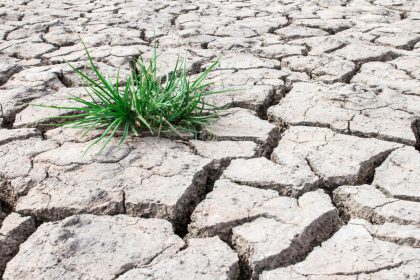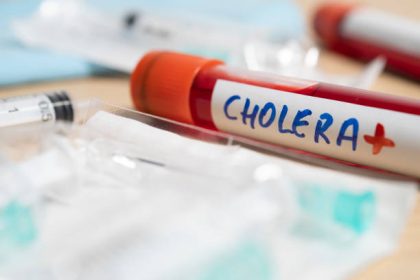John Kiunjuri mixed herbicides for years without gloves or mask and now suffers from Parkinson’s disease. A study found that maize, wheat, coffee, potatoes, kales and tomatoes are most heavily laced with hazardous pesticides, threatening both consumers and the environment.
There is a hidden crisis in Kenya’s farms. The pesticides used in growing our food are making farmers and their families seriously ill. This danger is spreading from rural areas into urban areas, putting everyone at risk, according to a 2023 study by the Heinrich Böll Foundation and Route to Food Initiative, the first to use empirical data to analyse the use of Highly Hazardous Pesticides (HHPs) in Kenya.
Titled ‘Toxic Business: Highly Hazardous Pesticides in Kenya,’ the study listed common foods like sukuma wiki (kales), tomatoes, and maize as the most heavily contaminated with hazardous chemicals, besides coffee and wheat.
The study revealed that about 63 per cent of pesticides sold locally are highly hazardous, and these comprise 76 per cent of total pesticides sold. To make matters worse, 44 per cent of pesticides sold in Kenya are banned in their countries of origin in what critics call ‘agro-colonisation’ of shifting environmental and health risks from the Global North to the Global South.
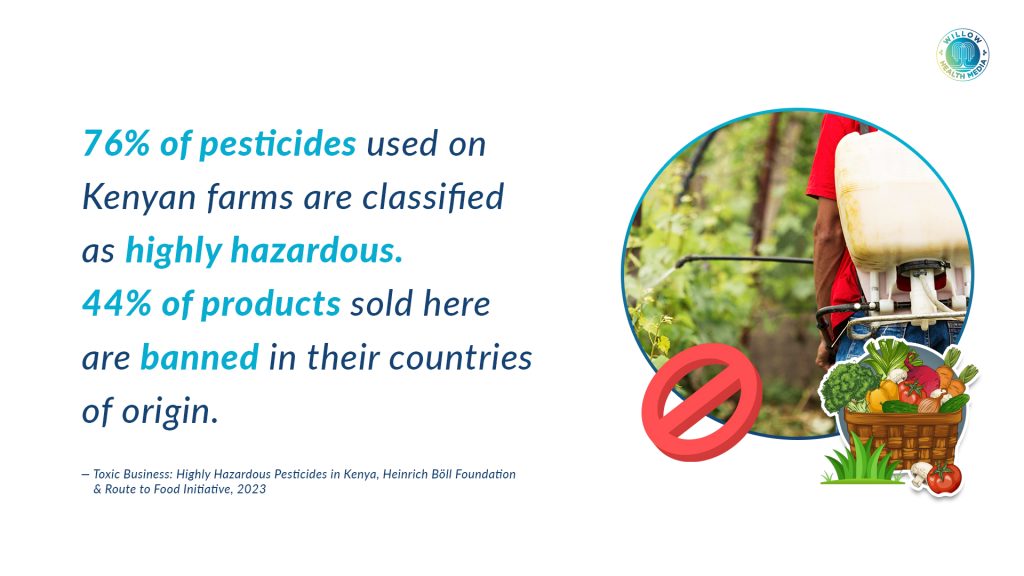
Additionally, only six out of 310 pesticides in use in Kenya meet international safety standards, suggesting systemic regulatory failure from the Pest Control Products Board (PCPB). While the PCPB has occasionally deregistered certain pesticides, the actions have been singled out for their sluggishness and insufficiency.
The effects of these chemicals can be told through the life of John Kiunjuri from Meru County.
For years, Kiunjuri worked on a commercial farm, mixing herbicides like paraquat without basic protective gear; no gloves, no mask. He was in his mid-40s when he first noticed a tremor in his hands. Today, in his mid-70s, he has been diagnosed with Parkinson’s disease, a debilitating, lifelong condition his doctor believes is linked to his exposure to the agrochemicals, especially Paraquat.
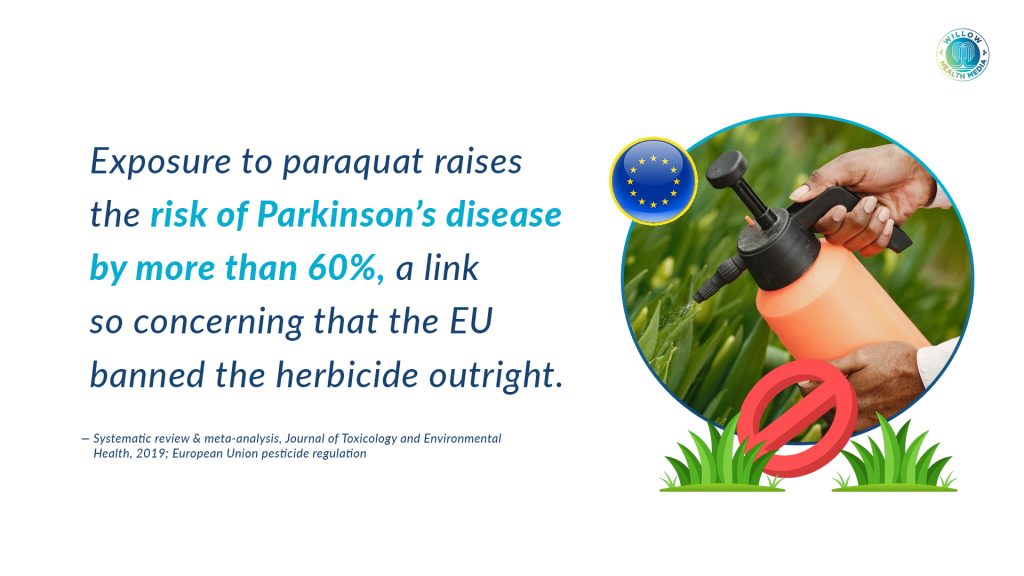
Farmers often misled by those who profit from the sale of these chemicals
Another farmer, Harriet Muthoni, from a different region, would often fall ill with a cough and skin irritation after spraying her crops. Her children were also affected by being in or near the fields during application. She used pesticides excessively, as advised by agro-dealers, but her crops still failed, and her family’s health deteriorated.
In short, farmers are often misled by those who profit from the sale of these chemicals, leading to overuse, misuse, and a vicious cycle of failing crops and declining health.
While the immediate health crisis is felt by farmers, the long-term impact on the Kenyan consumer is profound and widespread when staple foods are most heavily sprayed with HHPs, exposing people and the environment to toxins.
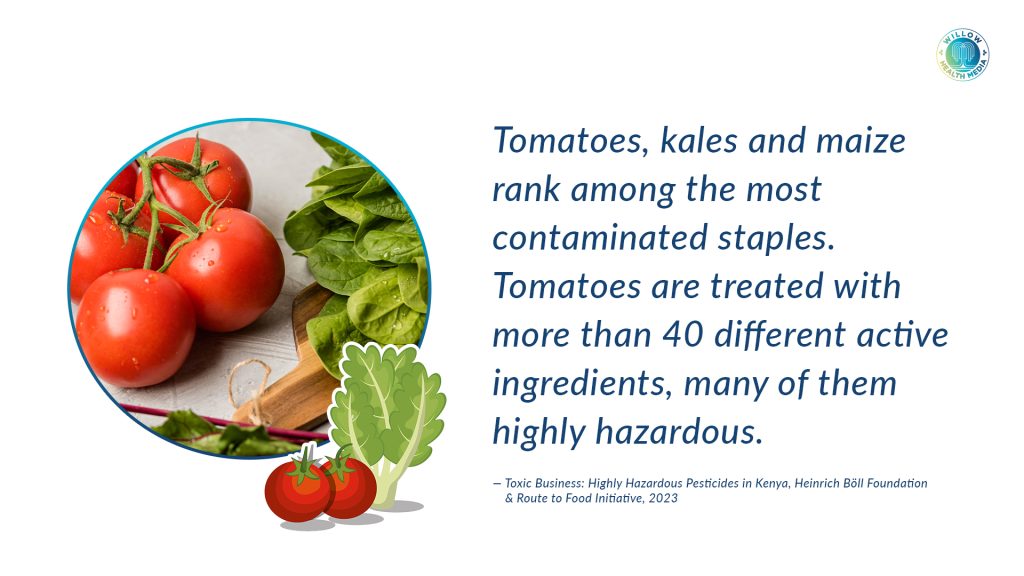
Local crops where toxins were most prevalent
Tomatoes are treated with 42 different active ingredients, many of which are HHPs, including fungicides like mancozeb, which is banned in the EU due to its link to cancer, according to a report by the European Chemicals Agency (ECHA).
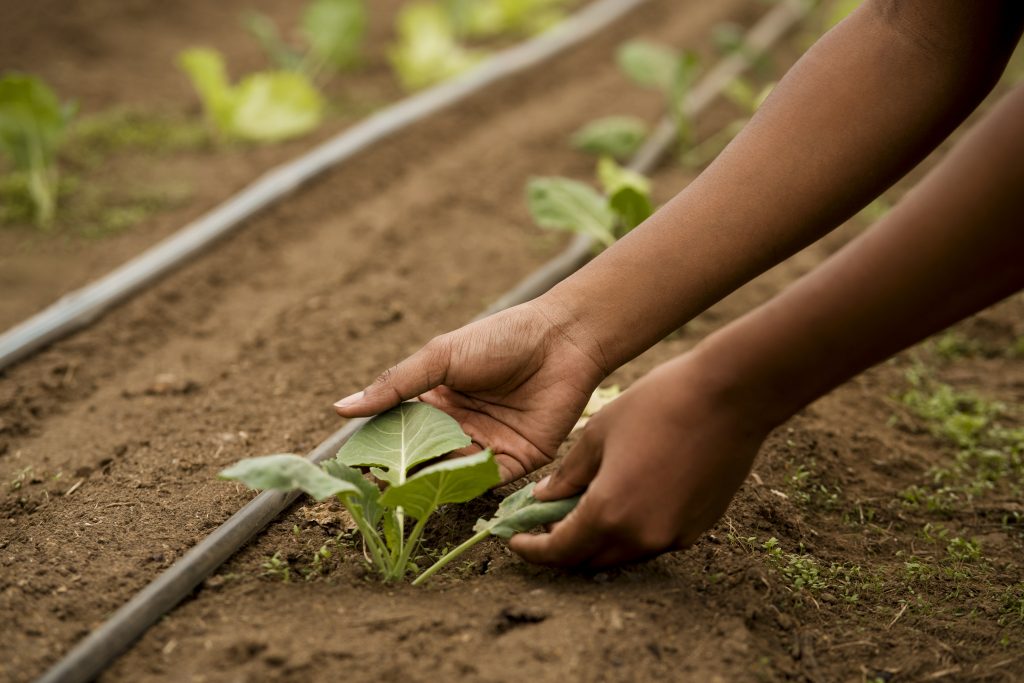
Kales (Sukuma Wiki), a cornerstone of the Kenyan diet, is frequently sprayed with pesticides like acephate, a chemical registered for use on roses and tobacco.
Maize, an essential food crop, is often sprayed with insecticides like chlorpyrifos and the herbicide atrazine. According to the European Food Safety Authority (EFSA), Chlorpyrifos- which is banned in 12 countries- is known for its neurotoxic effects, which can cause neurodevelopmental disorders like reduced IQ, memory loss, and ADHD in children, even at very low doses.
The insecticide also poses risks of genotoxicity (DNA damage) and acute poisoning, which can lead to severe symptoms such as seizures and respiratory failure at high exposure levels. Both the European Food Safety Authority (EFSA) and the U.S. Environmental Protection Agency (EPA) concluded that there is no safe level of exposure for chlorpyrifos, leading to bans aimed at protecting vulnerable populations like children and pregnant women.
Health Impacts: Short-Term and Long-Term
Short-Term Impacts: According to a systematic review published in Toxicology Reports Volume 13 in December 2024 titled, A systematic review of pesticide exposure, associated risks, and long-term human health impacts, farmers without proper training or protective equipment face acute poisoning with symptoms including headaches, nausea, vomiting, dizziness, and skin rashes. In severe cases, exposure leads to respiratory failure, chemical burns, and death.
Long-Term Impacts: Chronic health effects emerge years after exposure:
Cancer: Studies link pesticides like glyphosate to increased risk of non-Hodgkin’s lymphoma.
Infertility: Agricultural pesticides disrupt the endocrine system, causing hormonal imbalances that affect both male and female fertility.
Neurological Damage: Neurotoxic effects of organophosphates are linked to nervous system disorders, cognitive impairment, and increased risk of Parkinson’s and Alzheimer’s disease.
Brain Damage in Children: A review published in Environmental Research in 2022 highlights how pesticide exposure can affect normal cell development and lead to altered neurological growth, thus risking conditions like autism spectrum disorders. Reports from the Parliamentary Health Committee and Route to Food Initiative in 2020 noted a troubling increase in cases of nervous system diseases and developmental disorders, including autism, in Kenya and linked to widespread use of harmful pesticides, urging for their withdrawal.
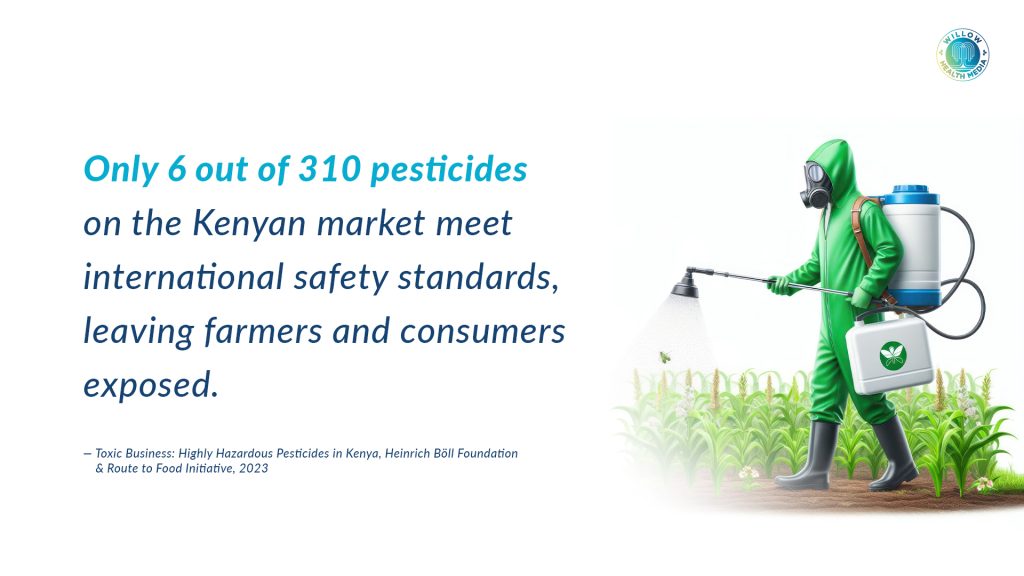
The 2023 study found Kenyan farmers still use dangerous pesticides due to several reasons including cost and availability as mostare the cheapest and easiest to find, aggressive marketing from companies without explaining the risks and belief by farmers that they are the strongest, fastest solution for pests besides lack of awareness on the long-term health and environmental dangers and poor regulation to keep banned products off the market.
Pesticide use creates serious environmental problems that extend far beyond the farm. These chemicals often run off into rivers, lakes, and groundwater, which poison aquatic life and contaminate vital drinking water sources.
Furthermore, they do not discriminate between pests and beneficial insects, wiping out crucial pollinators like bees and natural pest controllers like ladybugs. This loss of biodiversity severely disrupts local ecosystems.
The health of the soil is also damaged, as pesticides kill the microorganisms necessary for fertile land, leading to a harmful dependence on even more chemicals. Finally, these pesticide residues linger on common foods like strawberries, spinach, and grapes, raising concerns about the long-term, cumulative health effects of constant low-level exposure through our diets.
Fixing the pesticide problem requires action from farmers, consumers, and the government.
For Farmers:
We must promote eco-friendly pest control using natural methods and provide farmers with protective gear and proper training. Kenya should immediately ban all pesticides that are illegal in other countries.
For Consumers:
Choose organic produce when you can. Always wash fruits and vegetables thoroughly, peel them if possible, and eat a varied diet to limit exposure to any single pesticide. Demand change by contacting officials to insist on stricter safety laws and more transparency.
For Government:
Regulators must be empowered to put public health first. This means enacting stricter laws against toxic chemicals, investing in sustainable farming, and requiring that all pesticides sold in Kenya are first registered in their country of origin.
The tragedy of “Toxic Harvest” is a story of corporate greed, regulatory failure, and human suffering. But by embracing sustainable solutions and holding the power to account, we can ensure that our food nourishes, rather than poisons, our people.
Dr Madline Iseren is a Pharmacist and Essayist.
This article was first published by Willow Health Media on September 21, 2025.

















